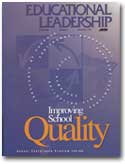A business/education consultant who has worked with Deming interprets how the 14 Points apply to educational issues such as grading, tracking, and school leadership.
Sometimes educators look at Deming's famous 14 Points and think they apply only to profit-making organizations. To what extent does Deming's work on quality apply to elementary and secondary schools?
Dr. Deming's work applies to every organization in the world. It applies to corporations, universities, service organizations, countries, families, and certainly to schools. Deming's work provides a conceptual framework for understanding any system.
The 14 Points apply to any organization, profit or nonprofit. For example, when you talk of cost there certainly are financial costs in education, as well as other costs. In families and interpersonal relationships, there are nonfinancial costs. So when Dr. Deming says that a quality way of living is the most cost-effective in the long run, that principle applies to any type of organization.
So when educators see something like, “Don't just buy from the lowest bidder,” they should see analogies at the school system and classroom levels, too?
Of course, just translation of the 14 Points isn't enough. I have seen schools where they learn a little about this and they start saying, “Oh, we're doing Deming.” But it may be at a superficial level. The 14 Points are not a recipe. They are interconnected and must be used in combination with the theory of profound knowledge.
Will you explain, then, what is meant by “profound knowledge”? It sounds obscure and mysterious, almost mystical.
The theory of a system, along with theories of variation, and of knowledge and psychology—taken together as interdependent components—form Deming's philosophy of profound knowledge.
Profound knowledge results from posing essential questions. The questions inevitably force us to ask about our processes. What is the system doing? Is it stable? In other words, is the distribution of the output highly predictable? Are the outcomes related to common causes—those associated with the system? Or are the causes special? Attempting to improve the process without understanding the causes of variation won't get you very far and may actually be harmful.
Theory of variation relates to an understanding of psychology. For example, many people think that to be fair and equitable that we treat everyone the same, but people are not the same. There is a great deal of natural variation in people.
Fortunately, we are beginning to value our diversity—although much of this is only rhetoric—because we still measure, grade, reward, and track as if there were one ideal. Or we base decisions on “averages” of people. In fact, we have created “standards” based on these false notions.
So, for example, the fact that all children don't learn to read at exactly the same age is natural variation.
Right. So why do we try to force everyone to be the same? And learning to read is not necessarily sequential; you can learn different things about reading at different times. So if we know that a group of 1st graders may be learning quite different things even though all of them are perfectly healthy and normal, why do we have a 1st grade? Why do we have a 2nd grade? The notion of grade levels is just one example of how we constrain our ability to tap intrinsic motivation and learning.
Many educators are aware of learning styles and what Howard Gardner calls multiple intelligences—all elements of what are apparently natural variation in humans. Once we've discovered that these differences are natural, not abnormal, then we need to redesign the system to provide for them, right?
Yes, but not only that. We have handicapped, learning-disabled, at-risk, special needs—whatever you want to call all these students who are examples of natural, normal variation in our society. We seem to feel that we've got to label all these groups as special causes—but they're not.
There's a very important point here. Some educators think that Dr. Deming is always seeking ways to reduce variation. In manufacturing processes that makes sense. In people processes it may not. To standardize everything would be one of the worst things we could do. We could reduce variation by eliminating people that do not fit the perfect profile, but that is not what we need. We must provide for the whole broad range of people and find ways to make them all successful, to experience joy in learning.
Okay, so human variability is one aspect of profound knowledge. What else?
I think one of the most important areas of Dr. Deming's work for education is the idea of intrinsic motivation and extrinsic rewards. There are so many activities and practices in education that falsely assume the benefits of extrinsic motivation (forces of destruction, as Dr. Deming calls them): gold stars, merit pay, judging people, MBO (management by objectives), grades, numerical goals, and quotas. Such things cause humiliation, they hurt people, and they channel people into doing things for rewards. And to say, “Well, if only the teachers would teach harder; if only the students would work harder; if only people were more motivated,” is begging the issue. All human beings are born with an intrinsic desire to learn and grow. We can destroy it, but it is there at birth.
We look at many at-risk kids and we say that they are not motivated. They are as motivated as anyone else. We have not learned how to tap into some motivations, so we write some people off because they are “different.” They do what makes sense; we haven't figured out what makes sense to them. We are not listening. It's a common cause issue—absolutely common cause—and we treat it as special cause.
You have said that Dr. Deming's work makes use of system theory, which involves the interrelationships among things. Let me ask, does profound knowledge include our growing recognition that every aspect of the globe we live on involves interdependence? Most people have only begun, in the last 20 or so years, to sense that interdependence. Perhaps the whole environmental movement is representative of Deming's profound knowledge.
I think so. Our growing awareness of the environment and long-term effects of pollution are examples. Also, our growing recognition that, when we interfere with a food chain, for example, it may change other aspects of the environment.
And in system thinking you recognize that some changes may not have an impact immediately; it may be down the road. What you do with a child in kindergarten may have an effect—positive or negative—20 years later. But too many policymakers want to measure every quarter (or every marking period!), just as corporations have done. Copying industry models can be terribly destructive. We hear of “benchmarking efforts”: look for “best practices” at successful companies or schools. Wrong! According to Dr. Deming, experience teaches nothing without theory. We must apply our experiences to give meaning—to learn. All too frequently schools (and businesses) want to act before planning. Constructing a plan and applying a theory have to come first.
Okay, with that brief glimpse of profound knowledge, I'd like to ask you a few questions about particular practices. For example, Deming says that it is counterproductive to evaluate individual workers using a formal appraisal system. That must mean that for schools, the common practice of continually grading students is a mistake. If that is true, what should teachers be doing instead?
Educators can answer that for themselves by asking what is the aim of their system. If the aim is for only some kids to get good grades, it creates a win-lose situation. And what's interesting with win-lose is that no matter who “wins,” there must be losers, so we all lose. Dr. Deming's Point Number 8 is: Drive out fear, create trust, create a climate for innovation. Well, grading drives in fear, creates an environment in which losers are being constantly identified. And even the students with the A+ grades are being told that their value, their importance, is in how they are ranked, not in who they are. If the aim of the system is to create joy in learning, then all students should win.
But what is the alternative to grading?
Today, the grading approach is much like the old industry technique of inspection at the end of the line—product inspection. Dr. Deming warns of the dangers of dependence on inspection.
The alternative is to focus on process. How can we improve the learning process? Information on student progress, understanding wide normal variation, can help improve the process. Students can be very helpful in collecting this data, perhaps by keeping control charts on their own progress. But be aware that anytime data are used to control, motivate, reward, threaten, or judge people, they will be very biased and invalid.
Now, Dr. Deming's advice to eliminate individual appraisal applies, of course, to teachers as well as to students. But a lot of states and school systems have laws and policies that require administrators to evaluate teachers using a formal written process. Deming would call such policies unwise, would he not?
Yes, he would. District policies may say you have to appraise teachers, but there are lots of ways to share information; it may be done even in a group setting. People do not have to be judged; they should never be judged. It could be getting a team of teachers together to talk about where learning is breaking down and what processes they need to work on together. Statistical tools, such as control charts, Pareto charts, and flow diagrams could help collect and analyze data.
You're saying that in many cases the required written record can simply reflect that kind of self-appraisal and joint decision making?
No, not exactly. Even self-appraisal that involves ranking, grading, or in any way measuring the person is destructive. We all are interdependent on others and the system. My performance will be, in part, dependent on system causes. If we focus on analyzing the processes, and making improvements, appraisals make no sense.
The laws that require that teachers be evaluated periodically were adopted because a lot of people feel that there are too many incompetent teachers in schools. If there is no individual appraisal, what can be done about incompetent teachers?
All people are different, teachers as well as students. Much of the variation is because of system or common causes, which keep people from working to their potential. If it is a system issue, don't try to solve the problem by focusing on individuals, much less threatening them! We do that with students constantly, and with teachers, too. We tend to assume that people are totally in control of their own performances. How could they be? Dr. Deming talks about “Mistake Number One”: to attribute to a special cause what is, in fact, a common cause. Frequently, the result of that is tampering. “Mistake Number Two” is the reverse.
Let's see if I understand what you're saying. For example, there are many problems with how teachers are educated in the universities, what sorts of specific training and help they get in their day-to-day work, the quality of curriculum and learning materials, the way the school day is organized, the fact that teachers rarely get much help from their colleagues. All of these things are part of the total system that prevents teachers from being more effective, is that right?
Yes. In a sense, we have been talking about one of the 14 Points: cease dependence on inspection. The field of education is just now getting into the era that industry frontrunners are beginning to move out of: inspection at the end of the line. The common cry is, “Let's test the teacher; let's test the students.” Everything is focused on outcomes. In industry, we call that product inspection. That is, you conform to specifications, or you're not acceptable. Process improvement requires an entirely different focus.
Certainly the approach to accountability that we often see being applied to schools most these days is what you call “product-oriented.”
Yes, and people think it's Deming. But it's definitely not Deming! And unfortunately the quality movement will probably be misunderstood, and we will see even more emphasis on accountability and numerical standards and goals.
What we should be focusing on is not the product, but the process. For example, the process of preparing educators, developing and supporting them, creating joy in their work. Have you ever seen a teacher who loves his or her job, who is involved and enthusiastic, but who is a bad teacher? I haven't. But we tend to look at every problem as a special cause; it's the individual teacher's fault. We have not refined our approach to dealing with processes. I think statistics can be very helpful here—not just data, but statistical theory, applied with and without numbers. Dr. Deming says that the most important things are unknowable and unmeasurable. So you don't measure people; you focus on the process.
Now, some teachers and principals listening to Dr. Deming have said, “We have to have performance appraisals so we can deal with the rotten apples.” But usually there are only a few people who—if you were to chart them—would be outside of control limits, or a special cause, and you deal with them as special causes; you get help for them, which may mean getting them out of the system. But if many teachers are having problems, it is probably a system issue. Then change the system.
So Deming is not saying that you never fire anyone?
No, he's not saying that. And some students might be in the wrong place, too. But all people can learn, and all people have something to contribute. To not be able to contribute because you're in the wrong environment is really one of the most devastating things that can happen to a person.
Let me ask about another issue of great interest to educators these days. There is a lot of talk about site-based decision making. Is this idea, sometimes called school-based management, consistent with Deming's ideas?
It might be—or it could be very destructive. If the central office says, “Okay, local school, we are going to empower you. You don't have the right tools; you don't have the knowledge or theory, but you can sit around and expand the size of your committees and make all your decisions together,” is that going to work? Absolutely not.
A central administrator or a school board might say, “We're giving you all the power and basically all we're going to do is evaluate you on your results.” You're saying that's not Deming.
That absolutely is not Deming. That is like saying, “Okay, willing workers, you run the factory, and we're going to measure the results at the end of the line, goodbye.”
That's abandoning management's responsibility.
Right. Approximately 94 percent of the problems at a plant or school are leadership issues, management decisions.
Yes, but management takes place at different levels. I've heard it argued eloquently that from a curriculum standpoint, all the central office should do is make objectives clear—what it is the students are supposed to learn—and have the best possible means of assessing that. And they should leave it to the schools to decide how best to achieve the objectives. I'm sure that advocates would say their approach is consistent with Deming's ideas about quality. You're saying it's not.
Well, it's a little bit like the national education goals. You know: “Let's raise graduation rates to 90 percent.” They have this vision of the ideal, and they establish goals. They don't tell you how to meet them. There may be easy ways to accomplish some goals: for example, give diplomas to 15-year-olds before they can drop out! If you focus only on the goal rather than optimizing the system, it's not going to work.
So how do you reform a centralized system if simplistic site-based management isn't the answer?
First of all, the leaders must understand what transformation means. They must have a solid theory and vision, and one does not get to that point by doing it superficially. It is an internal process; one must work from the inside first. It calls for soul-searching.
Many of the strategic planning models include in their process a provision to go away for a couple of days, sit down and work through a mission and set of principles. The idea is, you've got to look at your core beliefs and tap into those, because they are so basic to leadership.
But even that is not enough. It may appear to “work well,” but it will only create changes based on the old mental models (to use Peter Senge's term). School reform is taking place everywhere—but much of the activity is only activity. What is needed is transformation.
A little bit of competition, “fairer” grading, a few customer surveys, and an Annual Quality Report are a violation of the Deming philosophy. As one of my favorite tongue-twisters says, “A dab of Deming doesn't do it.”
Transformation, as Dr. Deming describes it, is discontinuous. It means fundamental change. Transformation does not mean adapting here, fixing a little there. An individual or an organization must completely change its way of thinking. Education must be redesigned from the ground up, based on theory, profound knowledge.





